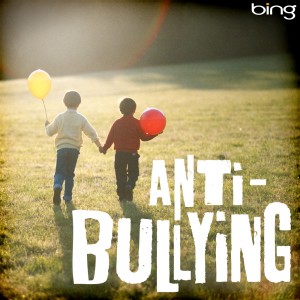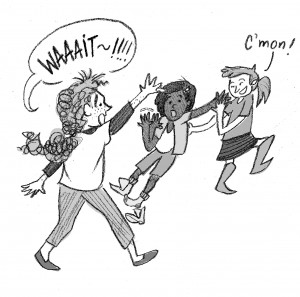|
|
August 19, 2013
They say schools are no longer in the business of teaching good citizenship, character, ethics or whatever you want to call it because educators are too busy “teaching to the test.” There’s no test for character that can be graded to give districts bragging rights for getting their scores up, so why teach this stuff? Because there actually is a test for character. It’s called Life and we ought to be teaching to it. When we don’t, we get this…
Hey Terra,
People at school don’t like me because me and this popular girl got into a little fight and I won. To get even she spread rumours about me saying I was in a mental institution for weird and violent behavior (a complete lie). Then everyone started to insult and ignore me. She does it the most. They say stuff like “Hey freak! No one likes you, so why dont you take a long walk off a short bridge?” Everyday. I don’t get a break from it. I insult them back. I know I probably shouldn’t bother, but it’s really hard not to. It’s like automatic for me now. I don’ t like being told to basically die. It’s not right for anyone to be told that.
So Fed Up
 See it. Name it. Stop it. Dear Fed Up,
These kids are being rude and cruel. I know it’s hard to hear this crap and try to brush it off. I’ve heard it said that no one can bring you down without your permission. That’s kinda true and kinda not. Humans are wired to be emotional. We’re also wired to want other people to like us. So when someone shouts angry words in your face or online, your human wiring kicks in. Your heart beats faster (and not in a good way) and you feel attacked. Even if the person isn’t someone you know or care about. Even if what he or she says is a lie. Words hurt. We feel it. So I totally understand the temptation to attack back. Except… it doesn’t help. You’ve seen that. It just makes things worse. Like throwing gasoline on a fire. That won’t put it out.
But you need to learn to take care of yourself. That doesn’t mean yelling nasty stuff back at people who are mean to you. You need to take care of yourself by figuring out how to response so that
a) you don’t give anyone permission to push your buttons so you automatically react like a puppet and
b) at least one adult at school and/or at home steps in and gets to the bottom of this so that this girl and her followers no longer feel they’ve got the right to talk to you or anyone in this way.
I just took my fingers off the keyboard for a minute. I’m taking a deep breath now, because hearing about this stuff every day really upsets me. I feel frustrated there are kids who believe it’s OK to be mean to other kids. I also feel frustrated that the adults who run schools (principals, counselors, teachers, coaches) have not done a better job making school a safer more accepting place for all students all the time.
Still breathing. It helps. Take some deep breaths on your own whenever you need to calm down. Then think about what would really make this situation better. Forget about trying to talk to the girl. Go to adults in power. Talk to your parents. Tell them what you told me. Tell them just how Fed Up you are. Talk to the principal (with or without your parents). Talk to the school counselor. This has to stop. Adults can make it stop. Remind them it’s their job.
Take care.
In friendship,
Terra
————–
I’m so sick of the situations that prompt these emails. Where are the adults in charge? Do they really not know what’s going on? Do they believe it’s not part of their “job” to get involved with fights between students? Do they worry they’ll get no support from their administrators if they step in? Do they worry they’ll get in trouble with parents for calling out kids who are disrepecting other kids? Or have they just given up, believing that peer harassment is a problem bigger than any remedy they might offer in the moment?
I don’t know what school administrators and teachers think about the bullying that persists in their schools. Why don’t you tell me? I’m listening.

April 27, 2013
UPDATE (See end of blog for exciting news about my new book.)
Last month I started working on a new girls’ friendship book with awesome illustrator Erica De Chavez.
If you have a daughter, you don’t need me to tell you that girl friendships can be super complicated and fraught with challenges for girls and their moms! When things get sticky, kindness and respect often go missing in action and feelings get hurt all around.
Since 1997, girls from all over the planet have been turning to me for help in navigating their friendship messes. I guess that makes me an expert on social garbage. The girls who email me are tweens and teens. But I thought, if I write a book to help younger girls, maybe they will have easier friendships when they get to middle school. We can always hope, right? But hope is no strategy for making things better. What our girls need are effective tools for managing conflicts. Combine those tools with the self-respect and social courage to use them… now we’re talking about effective strategies for positive change.
Here’s a sneak peek at the book:
Q: Every time me and my friend have a private conversation, this new girl pulls her away. What do I do??
A: I don’t blame you for not wanting your private conversations interrupted. That’s so annoying! It sounds like the new girl has lots of power, but she doesn’t have all the power. If your friend didn’t want to get pulled away she could tell the girl to stop. She hasn’t done that yet. And you haven’t yet told your friend how you’ve been feeling.
Real friends tell each other the truth. Talk to her. You might say something like this: “I don’t like it when ____ pulls you away from me. How come you let her do that?” Then close your mouth and listen to what your friend has to say.
The next time the new girl tries to yank her away, your friend will either stand up for herself or she’ll let herself be yanked. That’s her choice. One more thing you might think about: Why is the new girl snatching your friend? It’s not always easy being the “new girl” who doesn’t have friends yet. I think that would feel LONELY! She probably just wants a friend and doesn’t know a more polite way to make one. Maybe you and your friend could team up with her and be friends together. That could work!
Anyway, the snatching stuff needs to stop. So talk to your friend. If things don’t change, what are you going do? You can either stand there watching the two of them go off together or you can reach out to other girls and make some new friends. You see, you have choices too!
______________
Sneak peek #2 and sneak peek #3 of the Girls’ Friendship Q&A Book.
UPDATE: July 22, 2014 After a year in production, The Girls Q&A Book on Friendship will be published by Electric Eggplant in September. Just in time for the new school year and the inevitable friendship drama heading toward your 8–12 year old daughter. Every girl needs friendship support from time to time. My book provides that plus:real world advice for navigating through the “social garbage,” friendship quizzes, and advice from older girls about how to be a Super Friend. If you’d like to preorder The Girls Q&A Book on Friendship for a girl in your life, or you’d just like a personal heads-up when the book is available, email me (Connect@AnnieFox.com).
UPDATE: October 3, 2014 It’s here! The Girls Q&A Book on Friendship: 50 Ways to Fix a Friendship Without the DRAMA is now available in print and on Kindle (the ebook can be read on any device, your mobile phone, tablet, or computer with the free Kindle reader app). Visit GirlsQandA.com for an excerpt, reviews, and to order your copy.

November 8, 2012
I originally wrote a version of this article for TakePart.com, an interactive publisher and the digital arm of Participant Media. Check out my weekly Education posts there.
 "Help! I'm drowning in social garbage!" I’ve been answering teen email since 1997. The ongoing Q&A has made me an expert on the social garbage many 11-17 year olds slog through every day. Typical teen questions include:
- What do you do if your friend is mad at you but won’t tell you why?
- What do you do if people are spreading rumors about you and no one believes that they aren’t true?
- What do you do when friends pressure you to do stuff you don’t want to do, but you’re afraid not to because they’ll make fun of you?
Sound familiar? These might be the same issues we once dealt with, but our children aren’t responding to them the way we did before social media. When 21st-century kids experience peer conflicts, online and off, they typically respond with a level of social aggression (aka verbal violence) that damages individuals in profound ways and pollutes school climates everywhere.
In September I spoke with nearly a thousand students at a couple of international schools, one in Singapore and another in Chiang Mai, Thailand. We talked about Real Friends vs. the Other Kind, based on my Middle School Confidential series. In each presentation the kids and I discussed tough issues like: stress, peer approval addiction, and the brain’s occasional habit of working against our desire to do the right thing. Even though I was 7,000 miles from home, the comments and questions coming from these students expressed the same conflicts and emotional confusion I’ve heard repeatedly from kids in San Jose, St. Louis, and Philly.
Back in the last century, when we had a problem with someone at school, we went home for dinner with the family, did homework, and watched TV. Sometimes we even read a book to take our minds off school and social garbage. The next morning in class combatants were usually less combative and we were all better able to concentrate on whatever we were expected to learn.
Today’s kids are mind-melded with peers 24/7. School and home are equally conducive for frantic texting and getting more people involved in the drama du jour. Status anxiety regularly submerges so much mental real estate, our students are often flooded with destructive emotions. They can’t think clearly when they’re upset. No one can. Which is why the adults who live and work with kids need to actively teach kids to be good people, otherwise, their moral compasses will be calibrated solely by their equally clueless peers. (Not a pretty thought!)

July 14, 2012
Part 1 | Part 2 | Part 3 | Part 4
Here’s the final installment of this ‘expert’s‘ 4-part Bing Summer of Doing series. (Bing’s got lots of cool stuff happening through Sunday, but since the word of the week is Giving, tomorrow David and I are doing the AIDS WALK SF, so no blog from me. If you’ve missed anything I’ve served up on this shift, check out the blogs from Monday (Giving), Wednesday (Unplugging) and Friday (Urban Gardening). Today we’re talking Anti-bullying, so let’s get at it.
 Bing Summer of Doing – Be nice, do nice When stuff comes up between real friends, they show how much they value the friendship by working things out. That can be especially hard when Friend A crosses the line (knowingly or un) and Friend B is upset. But with real friends it’s worth the effort it takes to talk and listen and understand each other’s point of view.
Friendships get damaged when stuff that needs to be said is left unsaid. Unexpressed emotions don’t just fade away. Often they work like acid, silently eating away at a relationship’s foundation. We start doubting our friend’s intentions. We look for evidence to reinforce our doubts while demanding reassurances that our doubts are ungrounded. We talk about the friend instead of talking to him/her. If you’re beyond middle school, you know this crap never helps. It only makes things worse.
Kids with the stickiest peer relationship issues are 6th and 7th graders. Their interpersonal challenges have become increasingly complex. Unfortunately, their ability to resolve conflicts in their multi-tiered friendship doesn’t match the challenges they face. And so it goes in the 21st century. We communicate with more people, but the way we do it, through texting, chatting and tweeting, increases the likelihood of miscommunication, which leads to hurt, jealousy, betrayal, retaliation, AKA social garbage. Unless we learn to effectively resolve conflicts with the folks we like, we’re not going to be able to stand up for ourselves with truly aggressive people, i.e., bullies.
The following question was asked of me by a 6th grader:
What do you do if your friend is bullying you and you don’t want to hurt them?
Sounds like you’re getting hurt by a friend but aren’t willing to stand up for yourself. You’ve got to learn to be your own best friend. That means acting like you deserve to be treated with respect. This new self-respecting attitude won’t guarantee respect from others, but it does mean that when people treat you badly, you let them know it’s not OK.
You say you’re being hurt but you don’t want to “hurt” your friend by telling him/her to cut it out. I understand your hesitation. Nobody likes to be told that they’re out of line. Your friend might get mad at you and that’s never pleasant. S/he might say, “I don’t know what you’re talking about.” In which case you’re left feeling confused and embarrassed. Your friend might even accuse you of trying to “ruin” the friendship and may turn other friends against you. OR… s/he might stop and think about what you’ve just said and make some positive changes. That would be a good thing, right? But when we stay silent about things that are bothering us, the person who is ‘bullying’ continues to bully. Things usually just stay the same or get worse. But when we’re brave enough to risk standing up for ourselves (or for others who are being mistreated) we open the door for change.
Back to the question from the 6th grader. How would you have handled that situation when you were 11? How does the question and my advice, apply to any of your current relationships? Funny how our middle school experience can sometimes feel like it all happened in another lifetime… to someone else. Or it can feel like we’re still right there. sigh.
 — Older Posts »
| |















